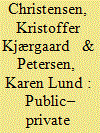| Srl | Item |
| 1 |
ID:
157971


|
|
|
|
|
| Summary/Abstract |
Forced male circumcision has not yet been recognized as a specific gendered human rights abuse in international humanitarian law. This article takes the first step towards assessing these acts by considering them in the context of post-election violence in Kenya in 2007. This case allows for the exploration of how forced male circumcision was used in a context of political violence and militia-led—and often state-sanctioned—terror. The article thus considers multiple legal issues and concerns that arise from this sort of violence in different contexts. I situate the case within a larger framework of conventional understandings on gender and violence as a means to question them and render them problematic. Specifically, I argue that understanding sexual violence as exclusively targeting women prevents appropriate prosecution of forced male circumcisions in Kenya and of sexual violence against men more generally. Sexual violence against men involves forms of emasculation in which perpetrators seek to feminize their victims by rendering them weak, violated and passive, in contradistinction to stereotypical masculine ideals. If one's relationship to femininity is a crucial issue in sexual violence, whether the victims are men or women, then being able to properly account for cases like Kenya, in both a political and a legal sense, is crucial to legal accountability for sexual violence more broadly.
|
|
|
|
|
|
|
|
|
|
|
|
|
|
|
|
| 2 |
ID:
157976


|
|
|
|
|
| Summary/Abstract |
The governance of cyber-security risks is seen as increasingly important to the security of the nation. However, cyber-security risks are characterized by a fundamental uncertainty, which poses a great challenge to their governance and calls for new modes of organizing security politics. Public–private partnerships (PPPs) are often seen as the answer to this challenge by enhancing flexibility and robustness through knowledge-sharing. Engaging with the literature on PPPs and the Danish practice on cyber security, we show how PPPs involve controversies over different threat realities of cyber security. This plays out as controversies over what is considered threatened, the scope of the issue and the kind of expertise to be mobilized. Arguing that PPPs on security are not defined narrowly by short-sighted strategic self-interest but also loyalty and commitment, we suggest that the innovative potential of such PPPs lie not in a possible consensus on a common purpose and threat reality, but in the ability to embrace divergent definitions and approaches to cyber security. Acknowledging the corporate interests and loyalty, we suggest a move towards the notion of partnering through dissent.
|
|
|
|
|
|
|
|
|
|
|
|
|
|
|
|